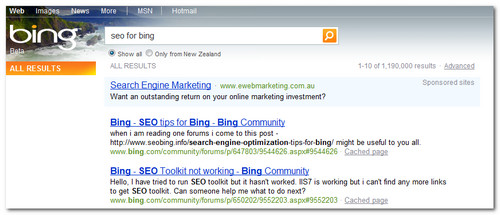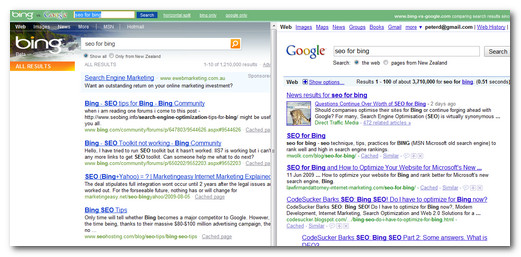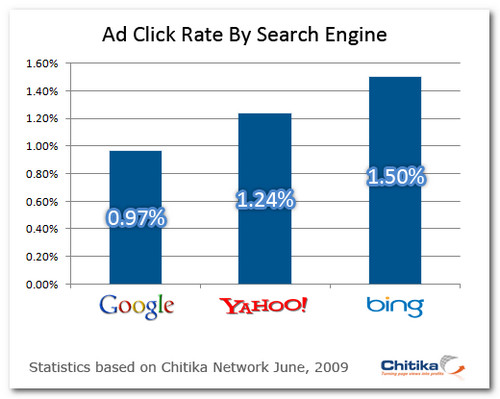Optimizing For Bing

How are your referral stats looking? Noticed more traffic from Bing lately?
According to a Nielsen report last month, Bing is growing faster than any other search engine. It was reported Bing had 10.7% of the total search market, up 2% from the month before. Yesterdays report from Hitwise suggests Bing has since dropped to around 8.96 percent.
So, somewhere around 8-10% perhaps.
The new statistics, from internet research firm Hitwise, will make disappointing reading for Mr Ballmer, who has said he is willing to spend as much as $11bn on search. Earlier this week he told The Daily Telegraph: “We’re trying to give Google a little competition in the search business
Microsoft have struggled for along time to make a dent in Google's share of the search market, so it looks like they are beginning to make inroads, albeit slowly. Microsoft have done a ton of marketing to promote Bing. They've introduced cutting edge features like visual search and voice support.
This is not a battle Microsoft can afford to lose, and for search marketers, competition between engines can only be a good thing.
Is Your Site Optimized For Bing?
The thought of adopting different optimization strategies for different engines feels so antiquated now.
Years ago, there used to be a lot of talk about how to optimize for the different engines. Some webmasters would go so far as to serve differently optimized pages to each major engine.
In the past few years, SEO has been about all-Google, all the time, so the rule of thumb is to optimize for Google, and the rest pretty much takes care of itself.
This advice still stands.
Keeping Up With Bing
Google has Google Guy (Matt Cutts). Likewise, the Bing search team regularly reaches out to the SEO community. SEOs should bookmark the Bing Webmaster Centre announcements.
In particular:
- Search Engine Optimization For Bing
- Making Links Work For You SEM 101
- Are You Content With Your Content
NB: You need a Live Id to see those links.
Microsoft released a comprehensive document for Webmasters. Check out page 23 where they address SEO specifically.
Like Google Guy advice, it tends towards the general and is ultimately self serving, but interesting to be aware of, nontheless.
The Bing Difference: Why Bother?
In terms of search engine results pages, the two engines do produce different results. Here's a nifty tool for side-by-side comparisons.
Why should you be interested in Bing at all?
Even though usage is lower, the user demographic for Bing is different to that of Google. Ask search marketers and you'll get anecdotal evidence that Bing/Yahoo users don't tend to be as web savvy as Google users, use the web less often, are more likely to click on ads, and are more likely to be involved in online shopping, whilst Google appeals more to researchers, webheads and geeks. If you're engaged in web commerce, you need to be thinking about Bing.
Bing Ranking Tips
From the Bing Features For Webmasters document:
Because of this new way of thinking about search, some webmasters might initially be concerned that the shortened primary organic listing in the new Bing SERP might render their SEO efforts as less effective. Instead, Bing makes it easier to compete for broad terms because it surfaces more categories automatically, increasing the number of results on the page and generating more relevant content.
In reality, the same SEO strategies you use for Google apply to Bing.
1. Get Your On-Page SEO Right
Nail the basics.
Make sure your content is unique, use H tags for titles, use alt tags for images, use unique page titles and description meta tags, one topic per page and ensure your copy is free from spelling and gramatical errors. Like Google, you can sign up for MS Webmaster Center which will help you spot and troubleshoot problems.
2. Quality Inbound Linking
Bing appears to favour linking from pages that share a similar topic area.
Is Bing a theme-based engine? Think of a theme as a topic pyramind. A themed site would have the topic "cars at the top. The level beneath that would be makes of cars i.e. Ford, Ferrari, Lotus, then below then models, then components, etc. The theory goes that a site should be all on the same topic to rank well, and links should come from sites on the same topic. Themes used to get discussed a lot, but fell out of fashion when people realised Google didn't use themes.
Is Bing using themes? I don't think so. Like Google, the algorithms appear to be largely page based, as opposed to site based. Bing looks at the topic of the page linking to you. If the linking page is on a similar topic, the target page receives a boost. Have a play around with the title tag on the linking page. Try to ensure the title tag keyword on the linking page is the same as the keyword you're targetting on your optimized page.
3. Domain Age
Domain age seems to be an important factor in Bing - the older, the better. Like Google, Bing tries to establish authority, and domain age is one way it does this.
Got any tips for optimizing for Bing? Any patterns you've noticed, particularly in respect to how Bing differs from Google?






Comments
Based on their search results they still love spammy anchor text and exact match domains. They are perhaps getting somewhat better on the link quality front, but still have a long way to go. And they really could improve a lot in their handling of 301 redirects.
I registered my site with them in their webmaster tools and submitted my sitemap.xml file. For some bizarre reason the only page they indexed was the sitemap.xml.gz file - and this isn't even the sitemap I registered (I registered the uncompressed sitemap.xml file). This means that anyone finding my site in the results would be prompted to download the file when they clicked on the link.
This inexplicably achieved a high domain score, but was a terrible result obviously, so I set up a redirect in my htaccess to take anyone that clicked that link to the homepage. A couple of days later and they have indexed a second page, this time sitempap.xml. sigh. A search of their forums shows I'm not the only person to have experienced this issue, but their doesn't seem to be any readily available solution.
Peter/Aaron
If Bing tends to reward links from pages with related keywords, particularly in the title, wouldn't a theme based hierarchical design tend to produce that type of internal linking or does this only seem to work for off site links?
If it works for internal links, a Cars pages would be linking to the BWM Cars page and the BMW Cars page would be linking to the BWM M5 page.
I have not looked into the importance of relevant links with Bing much (and their results show that in many cases sites and pages certainly need not be too relevant) but I think the hierarchical design rocks for SEO purposes due to how it flows link equity and if you wanted you could easily use the Bing inline search suggestions to help craft new page topics that may have been missed and/or edit current page titles to target them. :D
keyword-rich URLs...maybe a little too much.
Ive heard that Bing was the (mandatory) search engine of choice by many US schools (supposedly because of it potentially :-) having the best porn(or similar stuff) filtering feature).
I'm not sure what's up with that exactly, but heard about it on another forum (the former searchguild) and that it might explain bing's strong increase in market share.
One problem I've seen with Bing is a lack of attention to search refinements. On several occasions, I've seen the engine return the same top 5 or so results for query refinements... as though I typed the same thing. There's a parameter or two missing from their algo.
High page ranking in Bing gives a website an edge specially on Internet Explorer users, since their default search is Bing. But what about those who uses Firefox or Chrome or Safari, since Bing is not yet popular in other countries.
Well Chrome and Safari are not popular in many of those same countries as well. ;)
Add new comment